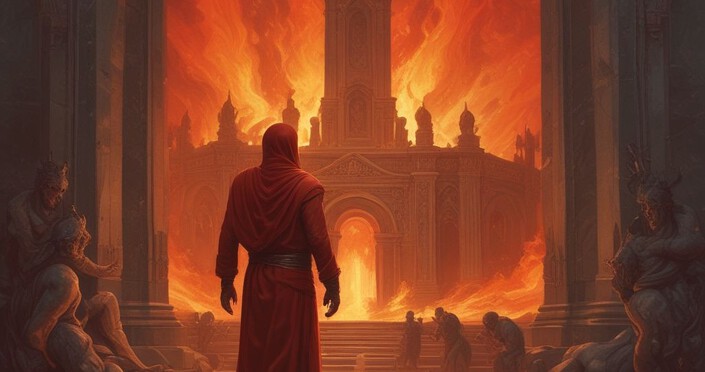The Inferno by Dante Alighieri

Analysis of the Novel, the Inferno by Dante Alighieri
The Inferno is a poem that was authored by Dante and is generally about Dante’s journey through hell. The poem additionally signifies sins nature in hell as well as the accompanying punishments in hell (Dante, & Wright, 2012). Individual’s that were involved in sinning while living are condemned in a just manner to the distinct punishments levels in hell in relation to their crimes on earth. The nine circles in the Inferno are utilized to represent a worse crime with a crueler punishment. The selected punishments that Dante allocates in hell are fair and in representation of those sins that were committed on earth based on the authoring period and the context of Christian believes (Dante, & Wright, 2012).
Context of the Novel, the Inferno by Dante
The Inferno is a portrayal of justice that is held by God, in that the involved sinners are punished based on their sins nature thus making the punishments suitable to their sins. In the Inferno, Dante makes a record of hell journey (Dante, & Wright, 2012). The Inferno is made up of views and thoughts of involved punishments of getting in hell as well as the associated sins in getting there. Writers who offer English assignment help at Edudorm essay writing service notes that based on the inferno justice is not an uncommon punishment or a cruel one which is developed to produce surprise. Literally some sinners become their own sins embodiment while others are victims of those sins that they conducted while they were alive (Dante, & Wright, 2012). This can be explained by, Greater sorrow cannot be found beyond that of joy recalling in the periods of wretchedness (Dante, & Wright, 2012).
Punishments and Suffering in the Novel, the Inferno by Dante
The punishments and his sins nature that are presented in the Inferno by Dante Alighieri are appropriate in illustration that separation from God results in unhappiness (Dante, & Longfellow, 2005). The author stated that the aim of his general comedy divine is to ensure that individuals are freed from misery thus delivering them in a state of happiness. The inferno contributes to this objective in different modes but conceivably most significant based on the way it encompasses the major theme that separation and divine rejection results in unhappiness that is inevitable. Experts who offer English dissertation help at Edudorm essay writing service indicates that this therefore implies that the more intentionally that one selects t to subject themselves to harm as well as others in trying to attain happiness by being influenced more by ego rather than focusing on love that is divine they move further and further actually from love, life and all those things that generates actual happiness in life (Dante, & Longfellow, 2005).
Each counter suffering is well developed and equipped to illustrate that every sin is particularly distinct but it is punishable equally after living (Dante, & Longfellow, 2005). The sufferings and the circles that are found in hell are illustrated in a mode of severity of sins. According to Dante animalistic in the Inferno, passion and flesh sins are punished in a less way as compared to the sins of cruelty, reasoning as well as calculation. The author believes that individual reasons are essential in separating them from sins (Dante, & Longfellow, 2005).
In Inferno, Dante goes through hell’s journey. On the journey Dante is able to view the distinct types of sins and each of them holds its special counter struggling (Dante, & Wright, 2012). Every punishment reflects the sins of an individual normally offering several ironic habits of anguish as a form of revenge for breaking the laws of God. Authors who offer English homework help at Edudorm essay writing service points that during the writing of the Inferno Dante developed sins and punishments which helps him in playing God. He accomplishes this in that he decides those that should be in hell and the rationale behind them being in hell. Dante utilizes these chances in striking at his personal foes thus placing them inside hell’s bowels (Dante, & Wright, 2012). By doing this he states that there is nothing to be looked upon because only the suffering agony and the departure from God that is there.
Theme of Departure from God
The general structure and nature of the presented sins and punishments by the author are embodied by the theme of departure from God and the resulting unhappiness. The nature of the sins and the punishments presented by the author additionally seem appropriate because individual’s wisdom can never be adequate (Dante, & Longfellow, 2005). In the Inferno, Dante presents an additional theme that despite the fact that individual wisdom is important in getting out of a misery state to that of gaining happiness, it can never be adequate. This therefore implies that individuals are expected to depend on grace and love that is divine (Dante, & Longfellow, 2005).
In the inferno, the author generates a striking correspondence amid the sins of the soul that are committed on earth as well as the punishments that this sins receives in hell in regard to the specific sins (Dante, & Wright, 2012). This easy though therefore acts as an illumination of the novels recurring concepts which are based on God’s justice perfection this is accomplished through bearing the fact that God moved in order to generate justice for all the sins with the appropriate punishments.
Theme of Wisdom in the Novel, the Inferno by Dante
Based on the information developed by the author in the Inferno, human wisdom is utilized in understanding the appropriateness of punishments to specific sins, the authority of developing justice and love in the objective to illustrate that the suitable punishments are habituated with sympathy (Dante, & Wright, 2012). Most definitely because the influence of developing hell was to develop justice then the punishments and the nature of the sins that the author presents are appropriate because their purposed in developing justice (Dante, & Wright, 2012). Tutors who offer English coursework help at Edudorm essay writing service acknowledges that according to Dante in the Inferno, hell exists in order to provide punishments to the individuals who commit sins against God. Therefore the appropriateness of hell’s particular punishments testifies to the perfection divine in that every sin is violates.
The appropriateness of the punishments and the presented sins in the Inferno can be verified by the exploration of judgments and morality that is conducted by the author. This is supported by the quote ‘’ the punishments that fits the conducted crime’’ (Dante, & Longfellow, 2005). Sins are punished based on the violation standards of individual behaviors as well as humanity which are across period as well as culture.
Sins are Treated and Punished Differently
The author of the Inferno holds that every sin is treated and punished differently based on the level of offense that an individual committed while still living. This therefore illustrates the effectiveness of the punishments as well as the sins nature because they are considered distinctly based on their seriousness (Dante, & Wright, 2012). The author of the Inferno makes trips to all the circles and thus realizes and stresses on the perfection of justice that is given by God as well as the seriousness that each sin creates in context of God. In the Inferno, Dante states that as he got into of the sacred justice that is in there (Dante, & Longfellow, 2005). Mentors who offer research essay help at Edudorm essay writing service recognizes that the concept of God’s punishment suitability figures in the structure of Hell’s nature that is presented by nature. The punishments do not seem appropriate for Dante and the rest because they seem harsh as Dante seems to be surprised (Dante, & Wright, 2012). His questions lie on the justness of the presented punishments because he understands that they were developed by God. He does this because based on a perspective of any individual the punishments are not fair.
The Appropriateness of the Punishments in the Novel, the Inferno by Dante
Moreover the appropriateness of the punishments and the sins that are presented by Dante in the Inferno is illustrated by the author’s view of counter-struggle (Dante, & Wright, 2012). This is the major nature’s rule which is applicable to hell and the author states that each sinner’s crime must be given a fitting and an equal punishment. However the punishments are not normally obvious or easy because they are normally figurative rather than being directly related to the appropriate sins. The idea of Dante on the inferno shows the different patterns of how individuals perceive sins (Dante, & Wright, 2012). Instructors who offer research writing help at Edudorm essay writing service argues that in the Inferno, Dante holds that all the sins cannot be treated as equals because punishments are determined by the weight of the actions effects. This therefore implies that when the sin causes more offense to the god then this means that the punishment should be severe. Dante develops the idea that this concept is fair because everyone will not have to suffer the sins of others. He adds that the punishments are appropriate because God does not base punishments on actions but also on thoughts (Dante, & Wright, 2012).
Conclusion
The nature of sins and the punishments presented in the Inferno by Dante are appropriate because the author states that punishments should arise from the particular crime and not particularly based on the caused crime. Dante argues that a sin should be less severe depending on the level of offense that it has subjected to God. The primary aim of Dante in the presentation of sins and the appropriate sins is based on that it was intended on providing biblical justice via counter-struggle. Teachers who offer research paper help at Edudorm essay writing service says that this required more depth and he therefore expanded the information using his personal intention as well as tradition. Dante is attempting to provide an abstract theme and make it understood by every individual. In this sense through the punishments he author does not wish to provide a re-definition of justice but he just presents a tangible religion to the perspective of individuals.
References
Dante, A., & Longfellow, H. W. (2005). The inferno. Mineola, N.Y: Dover Publications.
Dante, A., & Wright, S. F. (2012). Dante’s Inferno: The divine comedy, book one. Rockville, Md.: Borgo Press / Wildside Press.


